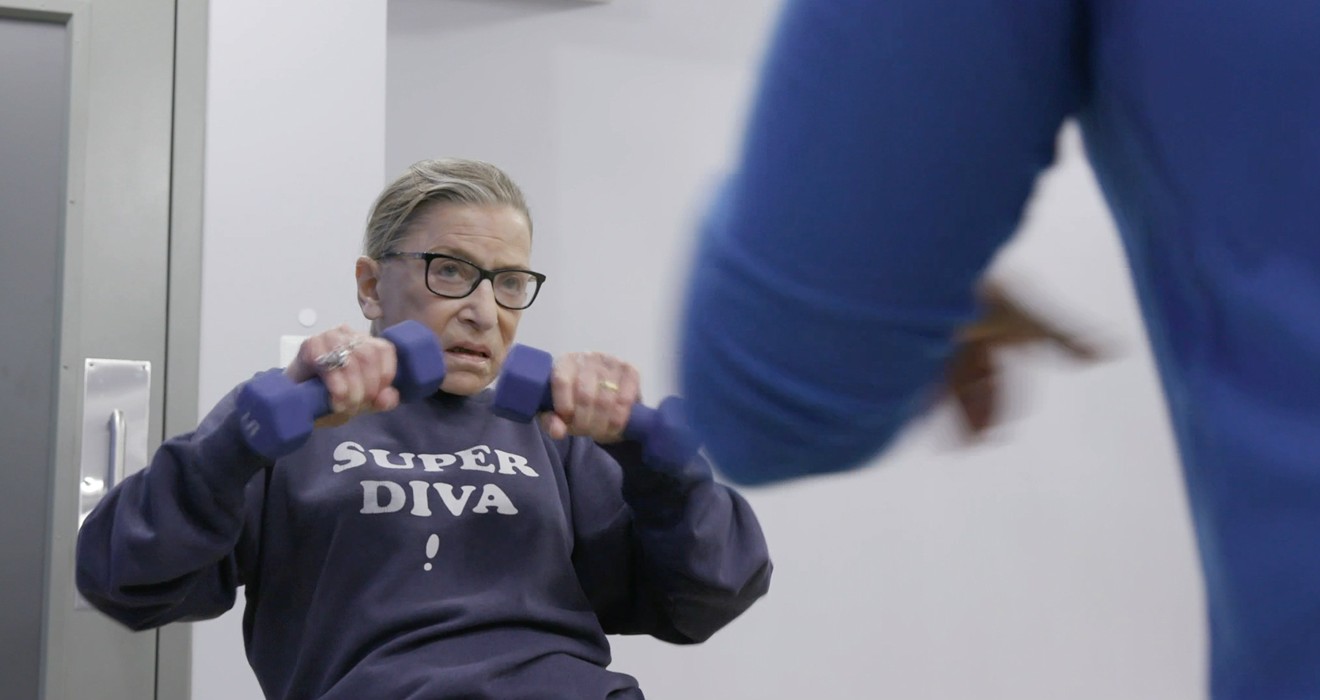Sometimes, one’s duties as a critic can clash with one’s feelings as a citizen. Betsy West and Julie Cohen’s mostly engaging documentary RBG, about the life and career of Supreme Court Justice Ruth Bader Ginsburg, stands as a film that informs, and sometimes even delights, with its portrait of one of the more remarkable lawyers, judges and feminist icons of our time. As a work of feel-good advocacy, it checks pretty much all the boxes, making its way through the key cases of her career, while also offering a personal look at the woman herself. Yet it’s hard not to want more from RBG, precisely because its subject is so remarkable and her ideas so consequential.
As they leap through the years, West and Cohen give us a compelling account of Ginsburg’s key cases, starting from her days as a lawyer with the ACLU's Women’s Rights Project. Just some samples: In 1973’s Frontiero v. Richardson, she represented a married female Air Force lieutenant who demanded the same housing allowance that married male service members were entitled to receive. In the case of 1975’s Weinberger v. Wiesenfeld, Ginsburg’s client was actually a man whose wife had died in childbirth. He was being denied a so-called “mother’s benefit” to help him raise his child; widows could receive it, but widowers could not.
As Ginsburg’s colleagues note, these were not just isolated matters. By taking such cases, she was building, step by step, a broader case, one for women’s equality, using each individual argument to advance a vision for equal rights. The filmmakers find intriguingly cinematic ways to represent these arguments: Onscreen, the text of Ginsburg’s speeches hovers in the air, as we hear audio of her reading key passages. It’s an aesthetically pleasing device that makes a persuasive, even emotional impact, testifying to the power of words and reason in helping build a more just world. These case studies continue when Ginsburg reaches the Supreme Court, as she becomes pivotal in issues such as allowing women into the Virginia Military Institute. In later years, as the court turns more conservative, she often finds herself on the losing end of cases, but there, too, her words stand as a beacon for the forces of progressivism.
West and Cohen know their audience, and they know how to speak to it. RBG advocates, but only to the converted. Along the way, the film playfully shows us glimpses of the cultural phenomenon Ginsburg has become (SNL skits, T-shirts, mugs, etc.). But it does so only with the slightest hint of irony, giving the sense that the film itself is just one more part of the phenomenon of #BrandRBG.
RBG does offer one quiet rebuke to a notion that I admit to having at times thought myself — that Ginsburg, an 85-year-old cancer survivor in a sharply divided Supreme Court, should maybe have retired while Barack Obama was still president so as to not put her seat — and the values for which she has advocated — in jeopardy. The film’s answer to that is simply to show us what a lively workhorse and exercise fiend this small, spirited woman remains.
Should the filmmakers have challenged their subject more? Ginsburg has had plenty of colleagues and friends on the Right. The film delves a fair bit into her lengthy friendship with the late arch-conservative firebrand Antonin Scalia; they were both big fans of opera. We also get some friendly quotes from Sen. Orrin Hatch. Early on, we hear snippets of conservative politicians and pundits declaring how dangerous she is. I wish we could have seen a bit more of that danger; I wish we could see Ginsburg’s ideas actively discussed onscreen, as opposed to merely presented, celebrated and cast in amber. This woman is, after all, one of the great thinkers and advocates of our time, and one assumes she loves a good argument. Watching RBG, I can’t shake the concern that the film exists in its own echo chamber, elegizing an ideological victory that has yet to come — if it does at all.
Anyway, I bought a mug.
[
{
"name": "Air - MediumRectangle - Inline Content - Mobile Display Size",
"component": "19274298",
"insertPoint": "2",
"requiredCountToDisplay": "2"
},{
"name": "Editor Picks",
"component": "17482312",
"insertPoint": "4",
"requiredCountToDisplay": "1"
},{
"name": "Inline Links",
"component": "18711090",
"insertPoint": "8th",
"startingPoint": 8,
"requiredCountToDisplay": "7",
"maxInsertions": 25
},{
"name": "Air - MediumRectangle - Combo - Inline Content",
"component": "17482310",
"insertPoint": "8th",
"startingPoint": 8,
"requiredCountToDisplay": "7",
"maxInsertions": 25
},{
"name": "Inline Links",
"component": "18711090",
"insertPoint": "8th",
"startingPoint": 12,
"requiredCountToDisplay": "11",
"maxInsertions": 25
},{
"name": "Air - Leaderboard Tower - Combo - Inline Content",
"component": "17482313",
"insertPoint": "8th",
"startingPoint": 12,
"requiredCountToDisplay": "11",
"maxInsertions": 25
}
]











